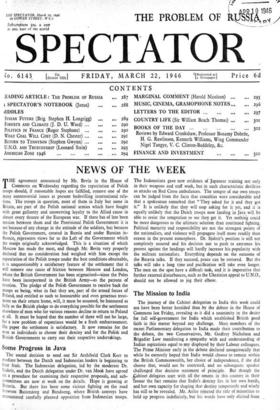Some Progress in Java
The sound decision to send out Sir Archibald Clark Kerr to mediate between the Dutch and Indonesian leaders is beginning to bear fruit. The Indonesian delegation, led by the moderate Dr. Slahrir, and the Dutch delegation under Dr. van Mook have agreed on a procedure for examining their respective proposals, and sub- committees are now at work on the details. Hope is growing at Batavia. But there has been some vicious fighting on the road between Buitenzorg and Bandoeng, where British convoys have encountered carefully planned opposition from Indonesian troops. The Indonesians gave new evidence of Japanese training not only in their weapons and staff work, but in such characteristic devilries as attacks on Red Cross ambulances. The temper of our own troops can be judged from the facts that casualties were considerable and that a spokesman remarked that "They asked for it and they got it." It is unlikely that they will stop asking for it yet, and it is equally unlikely that the Dutch troops now landing in Java will be able to resist the temptation to see they get it. Yet nothing could be more dangerous to the ultimate solution than continued fighting. Political maturity and responsibility are not the strongest points of the nationalists, and violence will propagate itself more readily than reason in the present atmosphere. Dr. Sjahrir's position is still not completely assured and his decision not to push to extremes his protest against the landings will hardly increase his popularity with the militant nationalists. Everything depends on the outcome of the Batavia talks. If they succeed, peace can be restored. But the talks will take a long time and pacification will take even longer. The men on the spot have a difficult task, and it is imperative that further external disturbances, such as the Ukrainian appeal to U.N.O., should not be allowed to jog their elbow.






























